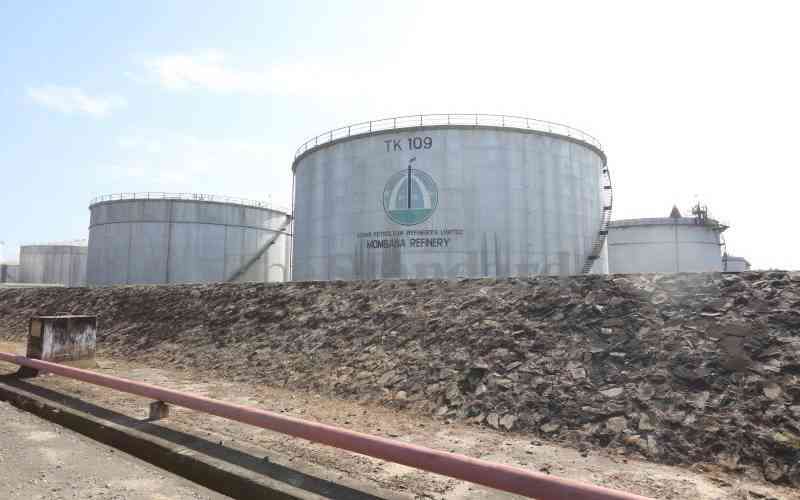
National Treasury has handed over the assets of the Kenya Petroleum Refineries Ltd (KPRL) to Kenya Pipeline Company (KPC).
The asset handover is through a transfer agreement signed by the Ministry of Energy and Petroleum and Treasury.
The Cabinet approved the acquisition of KPRL by KPC by way of share transfer in July this year. KPC has since 2017 been leasing KPRL facilities, using its tanks for the storage of petroleum products after an earlier acquisition plan fell through.
The transfer agreement and supporting documents were signed on Friday by National Treasury Cabinet Secretary Njuguna Ndung'u and Energy and Petroleum Cabinet Secretary Davis Chirchir.
"The government through the National Treasury is transferring 100 per cent of its shares held at KPRL to KPC without any monetary consideration.
"The signing of this share transfer agreement is to formalise and deepen the governance and operational relationship between KPC and KPRL hence creating a subsidiary-parent relationship between the two state corporations," said Prof Ndung'u.
"Indeed, the resilient and excellent performance of KPC since its inception gives us confidence that this takeover will produce a robust, virtuous, and value-creating business model between the two state corporations."
KPRL stopped refining crude oil in 2013. Due to underinvestment in the facility over the years, the refinery was inefficient and the result was that the fuel produced was not competitive and priced higher than imported products.
KPC is now looking at making use of the vast resources at KPRL to increase storage capacity for petroleum products.
It is also looking at building a bulk cooking gas import and handling storage facility, which is expected to significantly alter the Liquefied Petroleum Gas (LPG) market in the country, including increased usage of the gas among households. KPC said the planned investments at KPRL would enhance Mombasa's position as a petroleum trading hub as well as manage the rise in petroleum product prices.
"The acquisition is expected to enhance petroleum supply chain infrastructure and thereby result in security of supply and cost-efficiency through reduced demurrage costs," Energy Cabinet Secretary Davis Chirchir said.
"The acquisition of KPRL by KPC is symbiotic. It is envisaged that the financial performance of both institutions will improve."
He said the operationalisation and growth of KPRL under the new shareholder would bring social and economic benefits to the coastal region and Kenya at large.
Following the transaction, KPRL becomes a subsidiary of KPC. The move is geared at enhancing operations and seamless management of KPRL, which was not possible under the lease agreement.
KPRL is also eyeing the sale of electricity to Kenya Power by the end of next year.
The refinery put up a 9.3 megawatt (MW) power plant in 2012 for its internal use and planned to offload excess capacity to the grid, but this has gone unused for more than a decade now.
At the time, the Changamwe-based facility, which was importing and refining crude oil, was a heavy consumer of electricity but explained that it resorted to generating its own power due to frequent outages that contributed to high operational inefficiencies.
KPRL acting Chief Executive Joseph Ndoti said recently the firm has engaged State-owned power producer KenGen to offer consultancy on getting the plant operational.
He said KenGen would advise on how to monetise the thermal power plant.
"The power plant was a solution to the frequent blackouts then that were increasing the inefficiencies of KPRL during processing.
"The refinery's peak then was estimated to be between 4.5 and six megawatts when the refinery was operating at full capacity.
"The plan was to export the balance to the national grid. However, as soon as the project was completed in 2012, the decision to stop refining came into effect rendering the plant idle," said Mr Ndoti.
"We have recently signed a technical service agreement with KenGen, which is coming in as a consultant. We are working on a grid study that will inform, among other things, the technical requirements for us to feed the national grid and the tariff.
"The initial feasibility study done by KenGen shows that the power plant is viable. We hope that by the end of next year, we will have hooked this plant to the national grid and we will be exporting about eight megawatts to the national grid."
The factors that led to the delay of the decision on how to utilise the power plant included a lengthy exit process by Essar, which owned a 50 per cent stake in KPRL but decided to quit in 2013. The exit was not finalised until June 2016.
 The Standard Group Plc is a multi-media organization with investments in media
platforms spanning newspaper print
operations, television, radio broadcasting, digital and online services. The
Standard Group is recognized as a
leading multi-media house in Kenya with a key influence in matters of national and
international interest.
The Standard Group Plc is a multi-media organization with investments in media
platforms spanning newspaper print
operations, television, radio broadcasting, digital and online services. The
Standard Group is recognized as a
leading multi-media house in Kenya with a key influence in matters of national and
international interest.



